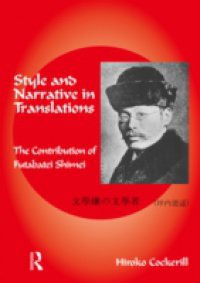Futabatei Shimei (1864-1909) is widely regarded as the founder of the modern Japanese novel. His novel Floating Clouds (1887-1889) was written in a colloquial narrative style that was unprecedented in Japanese literature, as was its negative hero. Futabatei was also a pioneer translator of Russian literature, translating works by Turgenev, Gogol, Tolstoy, Gorky and others - his translations had an enormous impact (perhaps even greater than his novels) on the development of Japanese literature. In this groundbreaking work, Hiroko Cockerill analyses the development of Futabatei's translation style and the influence of his work as a translator on his own writing. She takes us on a journey through Russian and Japanese literature, throwing light on the development of Japanese literary language, particularly in its use of verb forms to convey notions of tense and aspect that were embedded in European languages. Cockerill finds that Futabatei developed not one, but two distinctive styles, based on the influences of Turgenev and Gogol. While the influence of his translations from Turgenev was immediate and far-reaching, his more Gogolian translations are fascinating in their own right, and contemporary translators would do well to revisit them.

